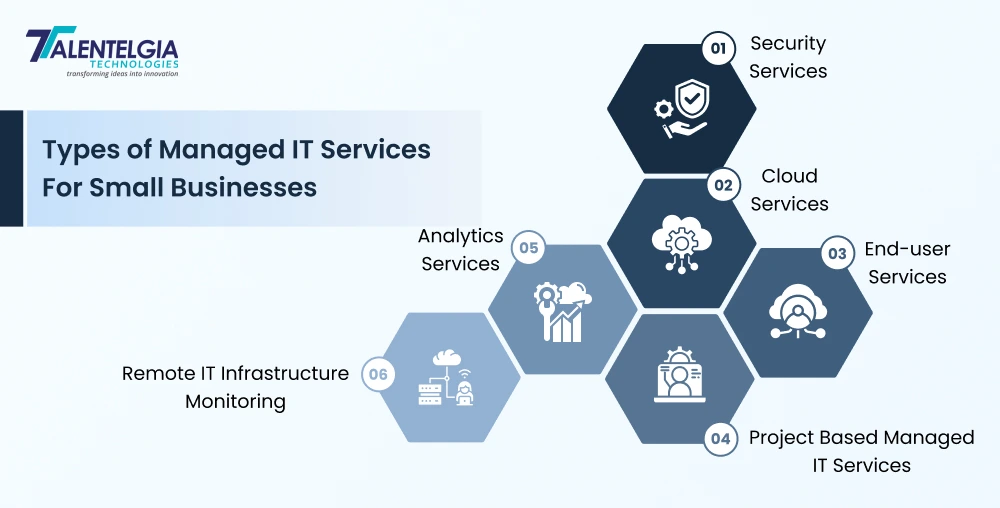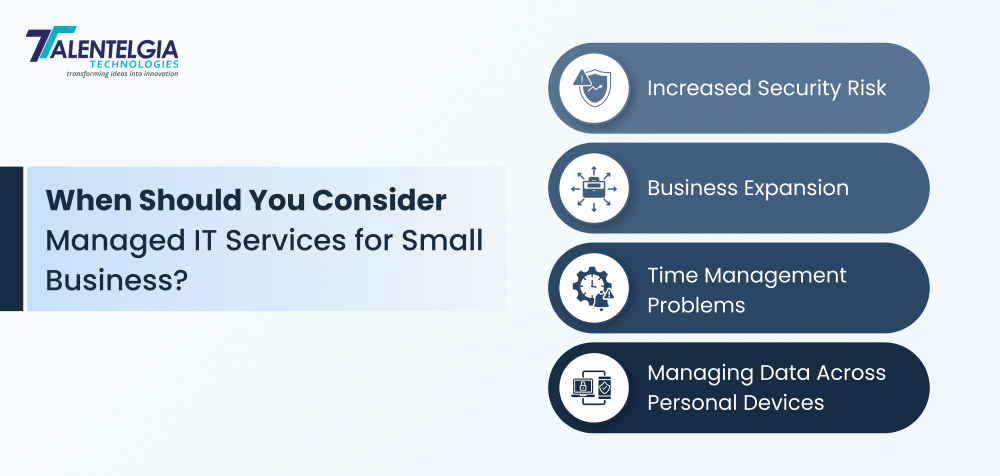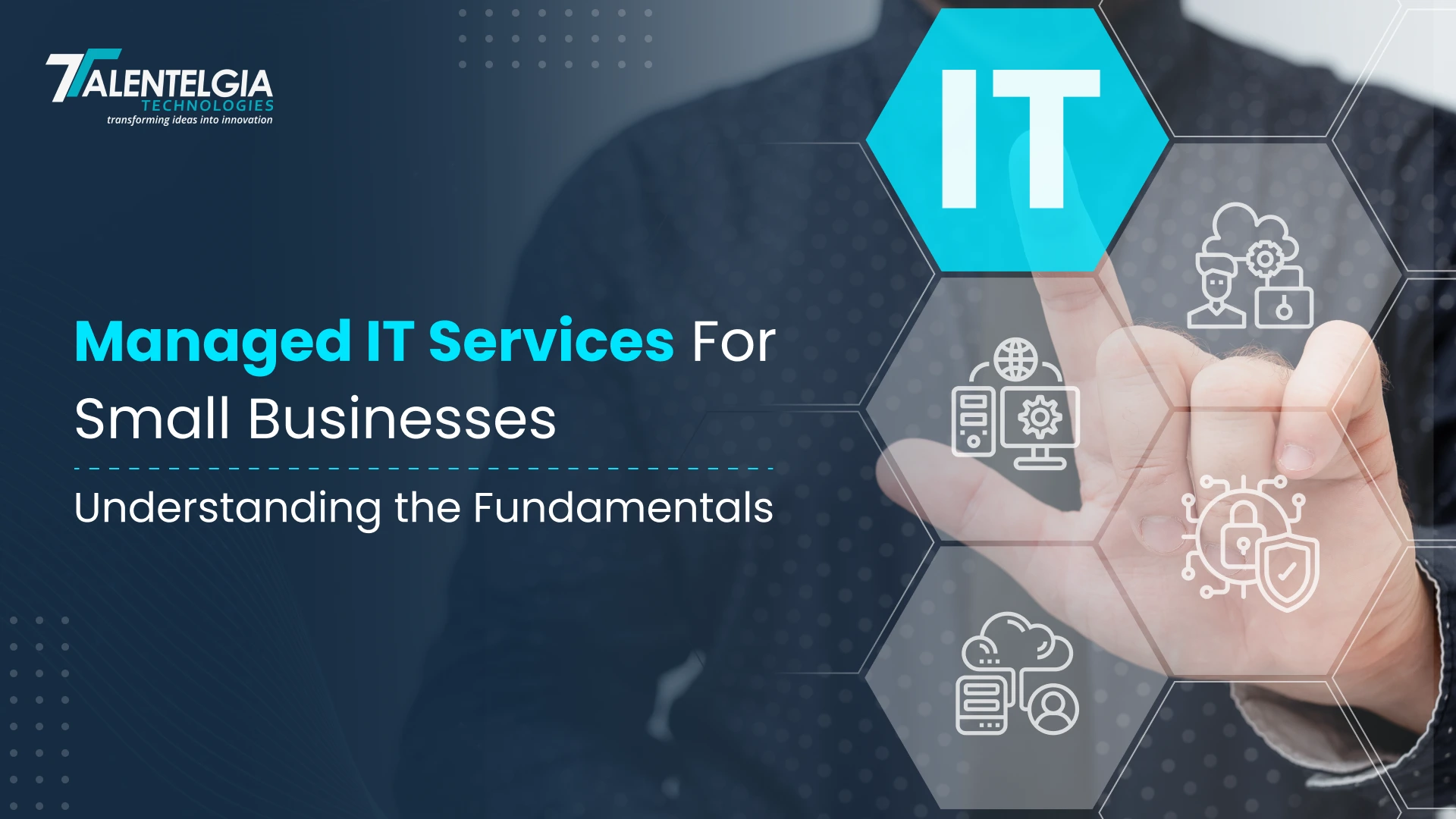Did you know? According to a JumpCloud Survey, 87.5% of small businesses used or were considering managed IT services. This massive growth highlights the increasing reliance on technology for business operations.
Tasks like network security and regular software maintenance require extensive resource deployment. Managed IT services for small businesses help avoid these challenges by outsourcing IT functions. It is therefore not just an option but a necessity for small businesses to stay ahead of their game. But how do you do that? In this blog, we will cover the fundamentals of managed IT services for small businesses, and how you can deploy these services to get the best results. We will also be covering the types of managed IT services for small businesses. Let’s get into it:
What are Managed IT services for Small Businesses?
Managed IT services are outsourced IT functions. In this process, businesses contract vendors (Managed IT Service Providers) to handle some or all of their IT functions. This enables them to access broader IT expertise without bearing the extra cost burden.
A great benefit of managed IT services is that they let companies focus on their core operations. On the contrary, the MSPs would focus on constant monitoring, troubleshooting, and providing proactive solutions. The result? Fewer disruptions reduced IT costs, and high performance and security.
The need for managed IT services is influenced by various factors. These might include:
- Increased pressure to adopt the latest technological trends.
- The need to ensure regulatory compliance with technology.
- A lack of technical skills within the organization’s internal team.
- Rising cybersecurity threats against businesses.
Under a service level agreement, your MSP will be responsible for the performance of managed service or equipment. This means that if at any time the equipment falters or the service is not as per the agreement, they can be held responsible.
Types of Managed IT Services For Small Businesses

Security Services
The rising demand for proactive IT management has led to MSPs’ focus on security services. Small businesses rely on MSPs to safeguard their data and IT systems against rising cyber threats. To meet this demand, MSPs now offer effectively managed security services, covering domains like threat detection, and firewall management.
Most MSPs have specific, dedicated security strategies or partnerships with specialized cybersecurity firms to give end-to-end protection. This enables businesses to outsource their security infrastructure, ensuring regular monitoring. Moreover, with evolving cyberattack incidents, MSPs provide improved services against breaches while reducing downtime.
Cloud Services
Cloud Computing transforms the way businesses store and access IT resources. Here, the MSPs enable cloud migration, ensuring a smooth transition from an on-premises system. Moreover, they manage infrastructure (IaaS), platforms (PaaS), and software (SaaS). This helps companies adopt the right solution as per their requirements. What will you gain? scalability and increased system capacity to handle growing demands.
MSPs are also concerned with cloud security and performance. They monitor cloud infrastructure, apply updates, and also protect breaches against data theft. Outsourcing cloud management also makes businesses flexible and cuts costs incurred in having large in-house teams.
End-user Services
Managed end-user services provide IT support to employees and clients. The main focus of these services is the channels and processes businesses use to resolve technical issues. MSPs establish dedicated help desks enabling users to get assistance from skilled agents.
Managed IT services for small businesses to handle issues like operating system errors, application installations, and software updates. By outsourcing these services, businesses can experience fast issue resolution and enhanced user experience.
Project Based Managed IT services
Project-based managed IT services for small businesses offer specific technology support for particular projects. Your MSP will handle tasks like SharePoint builds, SalesForce implementations, or business application evaluations.
A major advantage of MSPs is that, when businesses lack resources for critical IT projects, MSPs step in to offer guidance, They create project schedules, manage your budget, and ensure timely task completion. By partnering with a reputed MSP, companies gain access to specialized skills ensuring effective task delivery.
Remote IT Infrastructure Monitoring
MSPs are responsible for remotely managing and monitoring servers, workstations, and mobile devices in businesses. The service ensures systems run smoothly and securely. The performance is tracked continuously, issues are detected, and problems are solved before they become operational issues.
Strong competition between the two firms pushes innovation and specialization in remote monitoring services. As margins become thinner, providers invent newer and more sophisticated solutions for their clients. This shift increases the scope of managed IT services, improving the efficiency and reliability of the entire system.
Analytics Services
MSPs gather, assess, and protect user and customer data to drive business growth. It monitors site traffic, tracks social media engagement, and observes trends. They transform raw data into clear insights that support better decision-making.
As a small business owner, you can select all-in-one analytics services for enterprise-wide intelligence or pick special providers in people, market, or financial analytics. MSPs customize analytics services to address the specific needs of each project. You can therefore be assured of gaining actionable and useful insights for improving performance and outcomes.
When Should You Consider Managed IT Services for Small Business?

Managed IT services for small businesses are always beneficial in terms of improving efficiency. However, do all small businesses need managed IT services? That’s something debatable. The question you should be asking yourself is, are my business operations expanding at a much faster pace? Is the current infrastructure not fit to handle the increased scale? These two questions alone will give you deep insights into your need for managed IT services.
For a better understanding, we have listed down the scenarios in which you must go ahead with managed IT services for small businesses. Let’s get into it:
Increased Security Risk
According to Astra Security, “Cybercrime costs are set to rise by 15% over the next five years, reaching $10.5 trillion by 2025.” This alone should send alarms across businesses. Moreover, small businesses are more susceptible to these threats. Why? Because the majority of small businesses ignore the warning signs, assuming hackers only target large companies. This is not true at all. For instance, Embroker’s Cybercrime study reveals that nearly 43% of cyber-attacks target small businesses.
Managed service providers for IT services help small businesses mitigate such risks by providing comprehensive security measures. MSPs include regular security assessment, firewalls, antivirus management, and encryption of data. They also provide services like continuous monitoring, vulnerability testing, and employee training that can prevent a breach. All these are vital security infrastructures for protecting sensitive financial and client information from costly breaches.
Business Expansion
As small businesses grow, it gets challenging to manage increasing tools, employees, and inventory. Scaling up demands more hardware, software, and operational systems that meet the increased demands. This can become a nightmare when done internally, especially if you are a small business owner.
MSPs help relieve the burden of business growth, especially when dealing with IT infrastructure management, and systems upgrading. It also aids in tracking inventory, operational monitoring, and updates of installed software. What more? You get access to hassle-free solutions that allow expansion in all these activities. You can then focus more on the core business operations leaving the rest to MSPs.
So, in case your business is growing, try partnering with a managed IT service provider for small businesses. It will streamline all your IT processes, increase your productivity, and ensure that your infrastructure scales up proportionally with growth.
Time Management Problems
Small businesses tend to generate a lot of data, but employees are stretched thin on various tasks. Thus, essential processes such as data backup and security measures are overlooked or delayed. In the absence of proper management, this leads to inefficiencies, higher risks of data loss, and potential security breaches.
The MSPs help relieve this burden through the automation of critical tasks like file backups, updates, and data protection protocols. This relieves the employees to carry out core business activities. Automated solutions also reduce human error, making sure that the data is secured and accessible at all times, thus increasing efficiency in operations and ensuring that any important information will always be backed up, meaning less downtime in case of anything.
By partnering with MSPs, businesses can allocate their time and resources more effectively toward growth while simultaneously ensuring that they are protecting all of their information.
Managing Data Across Personal Devices
More and more employees now use multiple devices, such as personal smartphones, laptops, and tablets, to access business data. This increases the risk of a data breach since company information might be accessed from unsecured devices or networks. Managing this data across various platforms becomes increasingly complex for small businesses, especially when employees are working remotely or traveling.
MSPs prevent this by the implementation of secure protocols. For example, Virtual Private Networks, two-step authentications, or strong password policies. They also ensure device encryption or centralized data-access controls to avoid the leakage of sensitive business information. This also protects business information and keeps on track with standards in the respective industry.
Cost Of Managed IT Services For Small Businesses
Now that we have covered the fundamentals of managed IT services for small businesses, it’s important to understand the cost incurred. An important consideration here is that your MSP will charge you on the basis of the service being provided. In general, you can expect to pay somewhere between $150 -$400 per user per month. The ‘per user’ refers to employees who are using technology for their work. For instance, if you have 20 employees, you will be charged for 20 users. Let’s get into the detailed cost analysis:
Low-end Spectrum Services
Monitoring services usually fall under the low-cost scenario. This is between $99 and $150 per month. Here, the managed IT team is working like a security guard; constantly monitoring your server. In case something goes wrong, you will be immediately informed, but that’s about where it ends. You will handle the fixes, or you might have to incur extra costs from experts. While this model is cost-effective upfront, it can become frustrating and expensive if frequent breakdowns occur or if you require extra services like IT support, security, or strategic planning.
Mid-Spectrum Services
For small and midsize businesses, the most affordable options fall into the mid-to-high range. These services can begin from a cost of $100 to $400 per device or up to $150 to $175 per user. The managed IT providers monitor IT issues, proactively address the problems, and often prevent them from arising. This includes cybersecurity tests, upgrades to hardware and software, round-the-clock support, IT planning, backup, and disaster recovery.
Highest End of the Spectrum
The high-end packages usually are priced between $250 and $400 per user per month. This usually represents a fully hosted or cloud system in which most of the infrastructures are taken care of by the IT firm. This price point also includes comprehensive advanced cybersecurity services, project labor, and much more. It provides a comprehensive full suite of services, from ongoing support and infrastructure management, to name just a few.
Conclusion
Managed IT services are an excellent answer for small businesses that want to optimize their technology infrastructure and concentrate on growth. Outsourcing the IT functions is sure to give you better security, streamlined operations, and assurance that your systems remain reliable and scalable. The price will vary with your business's needs, but the benefits in terms of increased productivity, downtime reduction, and proactive support far outweigh the price. Whatever you do, whether growing or facing security challenges, engaging an MSP helps you navigate such challenges and gets your business into long-term success.


 Healthcare App Development Services
Healthcare App Development Services
 Real Estate Web Development Services
Real Estate Web Development Services
 E-Commerce App Development Services
E-Commerce App Development Services E-Commerce Web Development Services
E-Commerce Web Development Services Blockchain E-commerce Development Company
Blockchain E-commerce Development Company
 Fintech App Development Services
Fintech App Development Services Fintech Web Development
Fintech Web Development Blockchain Fintech Development Company
Blockchain Fintech Development Company
 E-Learning App Development Services
E-Learning App Development Services
 Restaurant App Development Company
Restaurant App Development Company
 Mobile Game Development Company
Mobile Game Development Company
 Travel App Development Company
Travel App Development Company
 Automotive Web Design
Automotive Web Design
 AI Traffic Management System
AI Traffic Management System
 AI Inventory Management Software
AI Inventory Management Software
 AI Software Development
AI Software Development  AI Development Company
AI Development Company  AI App Development Services
AI App Development Services  ChatGPT integration services
ChatGPT integration services  AI Integration Services
AI Integration Services  Generative AI Development Services
Generative AI Development Services  Natural Language Processing Company
Natural Language Processing Company Machine Learning Development
Machine Learning Development  Machine learning consulting services
Machine learning consulting services  Blockchain Development
Blockchain Development  Blockchain Software Development
Blockchain Software Development  Smart Contract Development Company
Smart Contract Development Company  NFT Marketplace Development Services
NFT Marketplace Development Services  Asset Tokenization Company
Asset Tokenization Company DeFi Wallet Development Company
DeFi Wallet Development Company Mobile App Development
Mobile App Development  IOS App Development
IOS App Development  Android App Development
Android App Development  Cross-Platform App Development
Cross-Platform App Development  Augmented Reality (AR) App Development
Augmented Reality (AR) App Development  Virtual Reality (VR) App Development
Virtual Reality (VR) App Development  Web App Development
Web App Development  SaaS App Development
SaaS App Development Flutter
Flutter  React Native
React Native  Swift (IOS)
Swift (IOS)  Kotlin (Android)
Kotlin (Android)  Mean Stack Development
Mean Stack Development  AngularJS Development
AngularJS Development  MongoDB Development
MongoDB Development  Nodejs Development
Nodejs Development  Database Development
Database Development Ruby on Rails Development
Ruby on Rails Development Expressjs Development
Expressjs Development  Full Stack Development
Full Stack Development  Web Development Services
Web Development Services  Laravel Development
Laravel Development  LAMP Development
LAMP Development  Custom PHP Development
Custom PHP Development  .Net Development
.Net Development  User Experience Design Services
User Experience Design Services  User Interface Design Services
User Interface Design Services  Automated Testing
Automated Testing  Manual Testing
Manual Testing  Digital Marketing Services
Digital Marketing Services 
 Ride-Sharing And Taxi Services
Ride-Sharing And Taxi Services Food Delivery Services
Food Delivery Services Grocery Delivery Services
Grocery Delivery Services Transportation And Logistics
Transportation And Logistics Car Wash App
Car Wash App Home Services App
Home Services App ERP Development Services
ERP Development Services CMS Development Services
CMS Development Services LMS Development
LMS Development CRM Development
CRM Development DevOps Development Services
DevOps Development Services AI Business Solutions
AI Business Solutions AI Cloud Solutions
AI Cloud Solutions AI Chatbot Development
AI Chatbot Development API Development
API Development Blockchain Product Development
Blockchain Product Development Cryptocurrency Wallet Development
Cryptocurrency Wallet Development About Talentelgia
About Talentelgia  Our Team
Our Team  Our Culture
Our Culture 
 Healthcare App Development Services
Healthcare App Development Services Real Estate Web Development Services
Real Estate Web Development Services E-Commerce App Development Services
E-Commerce App Development Services E-Commerce Web Development Services
E-Commerce Web Development Services Blockchain E-commerce
Development Company
Blockchain E-commerce
Development Company Fintech App Development Services
Fintech App Development Services Finance Web Development
Finance Web Development Blockchain Fintech
Development Company
Blockchain Fintech
Development Company E-Learning App Development Services
E-Learning App Development Services Restaurant App Development Company
Restaurant App Development Company Mobile Game Development Company
Mobile Game Development Company Travel App Development Company
Travel App Development Company Automotive Web Design
Automotive Web Design AI Traffic Management System
AI Traffic Management System AI Inventory Management Software
AI Inventory Management Software AI Software Development
AI Software Development AI Development Company
AI Development Company ChatGPT integration services
ChatGPT integration services AI Integration Services
AI Integration Services Machine Learning Development
Machine Learning Development Machine learning consulting services
Machine learning consulting services Blockchain Development
Blockchain Development Blockchain Software Development
Blockchain Software Development Smart contract development company
Smart contract development company NFT marketplace development services
NFT marketplace development services IOS App Development
IOS App Development Android App Development
Android App Development Cross-Platform App Development
Cross-Platform App Development Augmented Reality (AR) App
Development
Augmented Reality (AR) App
Development Virtual Reality (VR) App Development
Virtual Reality (VR) App Development Web App Development
Web App Development Flutter
Flutter React
Native
React
Native Swift
(IOS)
Swift
(IOS) Kotlin (Android)
Kotlin (Android) MEAN Stack Development
MEAN Stack Development AngularJS Development
AngularJS Development MongoDB Development
MongoDB Development Nodejs Development
Nodejs Development Database development services
Database development services Ruby on Rails Development services
Ruby on Rails Development services Expressjs Development
Expressjs Development Full Stack Development
Full Stack Development Web Development Services
Web Development Services Laravel Development
Laravel Development LAMP
Development
LAMP
Development Custom PHP Development
Custom PHP Development User Experience Design Services
User Experience Design Services User Interface Design Services
User Interface Design Services Automated Testing
Automated Testing Manual
Testing
Manual
Testing About Talentelgia
About Talentelgia Our Team
Our Team Our Culture
Our Culture

















 Write us on:
Write us on:  Business queries:
Business queries:  HR:
HR: 




